A Year of writing, Roucha, and lots of Rx
2024: what I wrote, read, ate, wore, thought, and survived.
The new year is upon us, and prior to having a baby, my “seasons” would have been marked by illness—changes in illness, new therapies tried, new medications added, or new procedures undergone, or else by my many moves: a move from California to Massachusetts, then back to California, from California to Oregon, Oregon to Florida, and so on.
This season of life—and this year in particular, however, is one where the months blur, memory thinning and growing watery. We did a lot and also very little. We left our home in the Keys and moved to a rental in Georgia, where T is attending school. We welcomed M into our home and navigated the growing pains of any new family: new mental loads, new routines, all in a new environment. Aoife grew and grew and grew, her development marked by big things and small: her first bottle of whole milk, her first French fry (she’s a fan), the first time she put her Melissa & Doug red carrots with felt tops into the proper farm slots, shaking her head no—to everything—and then shaking her yes—to some things, the first time she mimicked me eating from the pantry, the first time she mimed my washing of the floor. Work has been one of fits and starts, sprints and silences—impossible to predict, track, or account for. Yet, through it all, I have consistently documented these stringed months of life—in poems, in journal entries, on my iPhone.
Looking back, I see what an immense journey 2024 has been as a mom. And for those who have been with me through it all, I lay bare the year here—jotting down things I remember: things I read and ate, things I thought, grew angry at, fretted over. Things I went through, got through, or am still going through. It is at times frivolous, at times deep—dark, and at times reaching for outside meaning—a mosaic of moments that made up this fleeting, overwhelming, wild piece of life.
January
It’s the first day of the year, and it’s unseasonably chilly in Key West following a low pressure system, wind, rain, storms. I dress Aoife in her little Gap bear sweater, powder-blue sweatpants, and take a photo of her on the couch. I share a photo, type my best girlie. This month, I will buy and read Cynthia Cruz’s Back To The Woods. I will buy and read The Nursery. I will start this Substack as a way to force my hand. I will dress Aoife in outrageously large bows from a ridiculously named outfitter, Baby Bling Bows. Her strawberries (tumors) grow more prominent as her hair begins to shed.
My photo stream is full of my baby’s rosebud mouth, and not much work is coming in. It’s eerily silent. I am worried.
February
Family flies in, and two poems come out in print. I take photos: of gleaming refrigerators on a curb, of a meditating gnome statue under a market stall, of hibiscus in bloom.
Aoife is filling out, her hemangioma growing—which I mask in bows. I worry I am gendering her too early, then let the tangle thoughts around this drift. I am reading Chloe Cooper Jones’ Easy Beauty at night on a Kindle, alert to my baby’s every stirring. Still feeling like an alien in my body, I discover Mersea Catalina slub tees and buy several, hiding my body which is now amorphous. Mid-month, work comes in suddenly—furiously, and I need to double my output in half the time, all while nursing.
As a new family of three, Travis and I work hard to try and remember, revive our old joys, but they are difficult to pin down or name. One night we buy pierogis from the Polish Market, sauté them with onions. One night, we bring El Siboney’s roasted pork dish, black beans, yellow rice, Cuban bread, and plantains to the USCGS Ingham, which hosts a free sunset happy hour every Friday. $5 beer, wine. One night, we take Aoife to the top of the lighthouse to celebrate the full moon. We climb and climb and climb, only to find the moon masked by clouds.
This is the month I also realize something is wrong. I am scared to be alone with my baby. I am scared if I am with her and we are near the kitchen—that there are knives. I am scared if I am with her and changing her—because there are pillows. I see her demise everywhere, and always in—at—my hands. One day I walk down the street and think the people are looking at me not because I have a cute baby in a carrier, but because my cute baby is dead, limp against my chest. I am finishing The Nursery, and it feeds my delusions. I get stuck on loop. A friend tells me that in order to stop the intrusions, I need to speak their darkness aloud: this is not my thought, this is a thought. I write an email to my psychiatrist, because the more I think about the thoughts, the more these thoughts create more thoughts. She responds immediately, tells me this is expected but also because I recognize the thoughts to be wrong or scary (my term), I am “morally” on the right side of the thoughts, as if thoughts had sides.
I start Paxil the same day.
March
A long poem Holy Holy Holy, which I wrote in pregnancy, goes live. A company comes to clean our AC ducts, blowing poison through the house to kill bacteria, mold. I get my hair colored—white and shimmering. The one palm tree shading our deck is cut down in three hours, and my parents (visiting), Aoife, and I watch on intently. I join Zine Club and write about the ducts and the hair and the tree. I begin to lose weight, speeding through my work. I eat one half of an egg-and-cheese sandwich or BLT for breakfast each morning, saving the second half for the next day. I limit lunch to microwaved gyoza, seaweed salad, popcorn, salsa, cottage cheese. I start to feel an old thinness, then feed on that hunger. The fire making fire. I say yes to projects (yes, yes, yes!), and am insatiable. My writing is equally urgent, the cross-pollination between work and poetry seemingly real, so I sign up for more outlets, more workshops.
I feel impossibly smart—almost invincible, but things are not right.
In the middle of the month, I am pushing play on Spotify when I should be pressing stop on my breast pump. I look at my stationary bike’s calorie count instead of my output. I forget the names of months. Then, I lose entire moments. Trains of thought are no longer trains but strings of paper cars, every other carriage punched from my twine rail. One day, I can’t remember if I fed my baby, though my parents see me feed her minutes earlier. I cry, and they console me—tell me it has happened to them. They take me to dinner for mussels and frites at Salute! and decide I should stop the Paxil.
At month’s end, I am better, and we go to Chicago’s suburbs, Travis’ home. The area in winter is particularly depressing. The landscape: gray and flat. The sky: gray, flat. Mid-century home after mid-century home: slate-gray and rock, red and brick. There are carports. There is avocado-green trim in abundance. Here, Aoife coughs—congested—in the bedrooms. Here, Aoife refuses to nurse. “Uncomfortable” voices one aunt. Here, I tell Travis if I don’t laugh, I’ll cry. I write for Zine Club and tend my email, all while attached to the glow of a machine, its sputter. I pump every two hours, hoping to keep up my supply, which is sufficient—but barely. My hands: raw from washing plastic. My bones: beginning to ache.
April
Our nursing journey is officially at its end, and the tabebuia tree is in bloom on our street. Yellow and trumpet-like. We learn Micki will be leaving our small community, her cancer returned and spreading. “My stomach,” she texts.
We buy local grouper for sandwiches, and I make garlic-herbed potatoes, homemade tartar sauce, and spicy mayo. I am determined to regain my love of cooking and decide to pickle: radishes, cucumbers, onions. I buy white sugar, red wine vinegar, cut the veggies, let them soak in our mason jars. I feel venturesome. We go to watch the sunset over the pier. I feel something in me returning.
Memory is better, intrusive thoughts are better, though now I feel bone tender, bone tired.
My parents come for a few weeks this month, as they did the last month and the month before that, helping us keep Aoife at home—the island’s infant care lacking. Every Sunday, we eat corned beef and Reuben sandwiches at Goldman’s Deli, the “Sunday Gravy” at Roostica. The meatballs are as soft and warm as polenta.
While my parents are in town, we have a small ceremony where Aoife is blessed in Travis’ ship’s bell, an old naval tradition, though Travis is not in the navy.
I am eternally grateful.
Early May
We travel two days to our soon-to-be new home in Georgia. The drive is harrowing. I am pumping and washing and cleaning parts out of our SUV. Aoife is restless in her backseat. I give her a black-and-white plush cube for her to kick as we drive. I feel like crying. I cry. I cry with my knees aching and scrunched between cooler, diaper bag, pump, carseat. I cry when my doctor tells me I’ve been hypomanic and sings, “Maybe she’s born with it, maybe it’s Lamictal,” promoting a new med. When we arrive at Fort Moore’s installation—see where we had intended to live, I cry some more. I ask to be dropped off with Aoife at the hotel, where I pump milk, wash parts, and play with my baby. I am tired and sad and fatigued and am depressed by the prospect of not a new city, but this new city.
Driving back down to the Keys, after deciding we’ll live “in” town among the old Victorians, my mood instantly lifts. We stop at the Keys Fisheries for conch fritters, grouper, take photos of T and Aoife in a head-and-hole board—him a mermaid, her the fish. We make a stop at Baby’s Coffee for some fresh, local grounds.
When I return to our home, though, there is a shift. My insularity (the new motherhood cocoon? island living?) falls away, and I grow again furious at the world—at Israel’s actions in Gaza, at America’s support of Israel, that my tax dollars are going to genocide but also to keeping the American military-industrial complex running, of which I regretfully benefit.
I realize my work, my husband’s work, even this piece of the internet, is made possible by death.
Everything feels rotten.
Despite this, I begin Leslie Jamison’s Splinters and highlight the many ways she captures the pure joy of having a baby. Despite this, I commit myself to writing more joy.
Late May
Test results reveal an autoimmune issue, but when replicated, they say the same thing: something is there. Dark-lined, lurking, yet not taking any real shape: borderline. More testing is needed, but I am feeling better. It could just be the season. Poincianas are in bloom, and their fire-engine red, dumpster-fire color is everywhere. I go to Key West’s Tropic Cinema and see Evil Does Not Exist. I make a sheet pan of veggies, Kalamata olives, and feta. An essay I wrote in our Key West house, pregnant, gains a recognition. We find M, who will join our family from Argentina and help us juggle work and school and projects—really, life. Travis leaves his post, and we host a party with Publix subs, brownies, and beer. Bees take over our house, and we spend our final nights with the local beekeeper, devising plans to move the queen until time runs out, and we have to seal their point of egress. Aoife learns to pull herself up to standing. I finish weaning from pumping. I am surfaced and buy my first pair of Roucha denim, of which I will buy more. I over-indulge in my favorite passionfruit cupcakes from Key West Cakes. I over-indulge in my favorite hummus from Oasis, the island’s Uzbekistan restaurant (milk, I am told, is the trick). US-made bombs hit a refugee camp, and the world is stunned by the images—for what now feels like a second. Micki’s children begin to leave her belongings on the curbside. I spy a bookcase. We take the bookcase.
It is the only piece of furniture I will bring with us to Columbus when we move at month’s end.
Micki: a professor of English literature. Her granddaughter: also a young poet.
June
I feel better, somehow lifted. I am in the midst of The Artist’s Way, and we begin our journey to Columbus, staying in hotels in Key West and Georgia. We find one (a house) in Columbus’ Historic District online and sign the lease the same day. It is walkable to the riverfront and downtown, which they have branded—with some success, with some contention—“Uptown.”
Along our journey north, I get unexpected jobs that keep me busy, and then proceed to overextend myself—taking a workshop on birding and a second on motherhood. I finish neither, but I do successfully download the Merlin app to identify birds and also complete Louisa Hall’s Reproduction—part of the latter’s syllabus. I become fascinated not by Frankenstein (central to the Reproduction’s protagonist’s research) but by the writing of Frankenstein. The eruption of Mount Tambora in 1815 and the year without a summer, a summer that the Shelleys spent on Lake Geneva, the summer Frankenstein was written. The summer on the lake, the summer of the Shelleys and Lord Byron sounds complex and sad and also somehow incredible, and reading about it makes me hunger for inviolable quietude.
Within a week of arriving in Columbus, my parents fly in to help us prepare our rental for M’s arrival—a rental which is paint-splattered and riddled with cheap fixtures and ancient appliances that keep breaking. Aoife’s hemangioma begins to shrink on her crown. An old essay on illness comes out in Fence Steaming. M arrives.
July
I stop The Artist’s Way, attributing my lack of enthusiasm to author Julia Cameron’s focus on (1) money and (2) time as richters for creative success. Living in Muscogee County, I grow interested in Georgia as the once home of my ancestors, but quickly learn that history like so many histories has been washed away. And, also, I was not built for this place.
In Columbus, the heat and humidity are immense and smothering, and the house never falls below 86 degrees in the day. There are black flies lazing about our kitchen, forcing us to buy a brigade of fly swatters, and the AC is unable to keep up with the heat, the cool seeping out of the home’s old, thin windows.
T goes to school, M watches Aoife, and I work from the front room—my favorite caftans sticking to my thighs and arms.
This month, we visit The Scott & Zelda Fitzgerald Museum in Montgomery and see Zelda Fitzgerald’s paper dolls, muscled and outsized. The next day we go to Costco as a family of 4 and get COVID. Aoife projectile vomits her liquid Tylenol in our new rental’s hallway, and we rush her to the hospital with a 103-degree fever, which comes down quickly. From bed, I take screenshots of books I want to read: The Collected Stories of Lydia Davis, Veronica, Small Things Like These. Occasionally, I pull myself to my computer. When things improve, M makes us torre de panqueques with paper-thin pancakes, ham, cheese, lettuce, tomato, mayonnaise, boiled egg shredded like cheese atop. We learn in Argentinia, a particular drink calls you to mix Fernet and Coke, and together, we play Chinchón with a Spanish-suited deck of cards, as Aoife’s monitor crackles in the background.
One night, while porch sitting and feeling altogether Southern, we hear and see an owl. It’s the first time I’ve seen one in the wild. I don’t write about it, and now wonder why.
August
A month marked by travel and work and very little reading and writing. Aoife, M, and I fly north to see my parents and sister. We visit Westport, where I get Botox and eat Reuben egg rolls. We go to the local Christmas tree farm and take photos of the sunflowers. We see my best high school friends and discover an authentic Argentinian restaurant in Milford where we eat baked empanadas with chorizo and cheese, ham and cheese, and mushroom; parrillada chimichurri; flan with dulce de leche. My sister, M, and I go to NYC. We visit Chelsea Markets, take a boat tour, eat steak, mussels, and frites in the West Village. We see Gavin Matts in Greenwich Village, eat breakfast at Jack’s Wife Freda, and go to the Natural History Museum, where we buy Aoife a stuffed giraffe who will be named Joseph. Then, M, Aoife, and I go to the South Shore and North Shore of Boston, see friends, and celebrate love. Salem feels like home—to me and to M. We have dinner at an old pub, take a ghost tour, and put mints on the benches of the Salem Witch Trials Memorial. This part of the country is hard to leave.
September
Back in the South, everything condenses with the heat, as if the land were a steamed bun that broke horribly open. Aoife takes swim classes. She wears a blue plaid bikini with two cherries across her chest and indulges those watching from the bleachers. I take an essay workshop and begin what feels like a bigger piece emerging: a book-length essay on childhood witnessing, mothering, maternal ambivalence, labor, featureless, faceless women, and the flies that remain fat, lazy, and everywhere in our home.
As a family, we visit the “Little Grand Canyon” about an hour from our home, which is just the erosion of a coastal plain. We attend the Friday night music concerts in town. One band—made up exclusively of nurses and doctors in town—is called Do Not Resuscitate, which I don’t find funny.
I begin Sarah Manguso’s Liars. I read part of Lars Horn’s Voice of the Fish, about their artist mother, her making casts of them, her asking them to play dead for her artistry, them feeding alcohol to her in the tub. I am taken by the image of the rim of the glass, the rim of the tub, and bookmark the full work for later. Beginning to feel unwell again (my gastroparesis returning after weaning from breastfeeding), I prepare myself for my first elemental diet in well over a year. Then I begin it.
At month’s end, a swarm of dragonflies takes to skimming our neighbor’s yard. They weave in and out like needles, too fast to catch on film. Their descent on her lawn feels prophetic, meaningful. Our neighbor says it’s just the standing water.
October
Work is busy; my diet is over. For lunches, I eat frozen Bibigo dumplings, finding the divinity in seasoned pork. I boil Momofuku noodles, then cut them in half before pouring the packets of sauce over them: Soy & Scallion, Tingly Chili, Spicy Soy, Spicy Chili.
Aoife turns one, and we celebrate with an overpriced flamingo cake that is fondant-heavy and artistry-poor. We bring Montessori toys and toddler-friendly cupcakes to the library for each of her classmates. She gets a kitchen set with burners that “catch” like a gas stove, a freezer that dispenses ice. Later the same week, we take our first trip to Savannah. The Spanish moss makes everything ethereal, and we spend a little of each day near the fountain in Forsyth Park. We revel in the architecture. We eat Reubens at an Irish pub, relish in brisket burgers with fig jam, homemade mac & cheese, fried clam strips, cucumber-watermelon salad.
Back home, I finally find a psychiatrist. I start Lamictal. I meet with the local GI. I cry in their office, begging them for help with my reflux (10 years, 2 surgeries). They schedule an endoscopy. They give me a tissue. I take on two new positions—one writing for The Subtext, one editing with b l u s h. I look (at last) for a rheumatologist, but find none of note nearby. We buy pumpkins and ghoulish costumes for Halloween. In the spirit of the season, I take a Monsters Workshop with Mathias Svalina. As part of the two-day workshop, I read It Lasts Forever And Then It Ends in three days. I am struck by the crow in the protagonist’s ribs, the namelessness of the undead, the protagonist’s urge to run to the sea, longing for home. In landlocked Georgia, this—in particular—haunts me. I miss the Oregon dunes.
November
I get back to documenting joy. Joy, joy, joy—the second half of my year’s theme. I photograph Aoife in a burnt-orange checkered dress at a wine-tasting event, Aoife in pink-and-purple Carter’s tartan eating Cheetos from her chair, Aoife in an Honest Company tropical onesie hooraying her first set of Vans. M feels a little homesick, so we go to a comedy club together, take Aoife to the Columbus Museum where she creates a painting using food-colored Cool Whip. I go for a run. I go for a second run. It is at last cold, the light like river water soaking my ankles. Travis and I have our second date night in over a year, drinking matcha cocktails with vodka-infused whipped cream, plastic butterflies perched on our glass’ rims. It’s indulgent and girly but needed. Thanksgiving is spent away from Georgia in Pensacola Beach. We visit Fort Pickens’ seashore, see old friends, and eat candied sweet potatoes and apples, crab cakes, stuffing with rosemary and thyme. We rush from our condo in the 60-degree temps to catch sunset each night. The sand is white and cool like glass. M takes photos with her DSLR camera of all of us, Aoife, the sun, its passing. Due to an onset of aphasia that has become noticeable, scary, I stop my Lamictal.
December
I do my second elemental diet of the year. Within a few days, my bones begin their familiar ache, my stomach carves knowingly into itself. Even through the diet, pressure in my chest continues, pain shoots vertically, laterally, diagonally, and yet I feel I can at last rest, find that something I’ve been missing—a stillness? a softness?—before the mad dash of the season.
I read Cusk’s Outline, begin Stephanie Cawley’s No More Flowers, order The World According to Joan Didion. I take another poetry workshop. We hang multi-colored Christmas lights in our living room. I play Carol of the Bells, and during a second trip to Destin, Florida, make Pizzelles. We dance every evening to Jingle Bell Rock. A cat finds a home on our porch, and we begin to feed. In a way, it becomes ours—each morning, Aoife running to the fore of our rental carrying her own stuffed kitty, mewing and meowing then sticking her hand into the mail slot searchingly.
After months of steady projects, work is once again slow. I worry a lot, then a little, and then make peace with sereneness. I still don’t feel well after my diet and worry now something is wrong: Barrett’s esophagus, worsening gastroparesis, a herniation, even cancer. I keep this to myself—the worry, the sickness, though I do cry one Sunday, in bed and Aoife trails my tears with her fingers—sopping them up with her skin, then pushing against my eye’s tear well as if trying to make them stop.
Before our final trip of the year—to the city of San Juan and the beaches of Rincon and Cabo Rojo, I write this Substack but hesitate on pressing send. This place once a writer’s watering hole, now seemingly filled with more and more listicles and diary-bent entries, people peddling words for money.
While we hide our skin from the Caribbean sun under the shade of a side-lying palm, a friend posted a quote about how in this world of attention scarcity, the greatest act of citizenship is learning is to withdraw your attention, refocus your efforts on the battle or battles you can fight. For me, this singular message seems to extend from the political to the personal.
Now more than ever, I think this winter season should be one of recursiveness without a point, calm, pleasure—not one of productivity. I will continue to write, that I am sure. And, post here, too. But I also want to withdraw and not just write joy, but find joy. I want to “make” bagels again—not the bagels themselves, but the ritual of dressing them: light cream cheese, sliced Roma tomatoes, chopped red onion, salty capers. I want to read Sally Rooney’s Intermezzo in full and—yes—maybe even Fourth Wing. I want to buy a Criterion Collection subscription, watch Strangers on a Train, Cleo from 5 to 7, Tokyo Story. I want to enjoy podcasts on runs as I once did—pre-baby (and perineal tear), jogging along to Jeanne Marie Laskas’ voice.
And, like any mother, I want to do the only-wished-for. Rent a hotel room. And, watch Netflix. And, rot. Preferably on the Oregon coast, with a foraged mushroom pizza, listening to the rain.
***
Friends of Mother Of,
Thank you for being here with me through this year.
For listening, for enjoying, for telling me what you love.
More to come, contemplate—complicate—in the new year.
All health, happiness, and goodness,
S




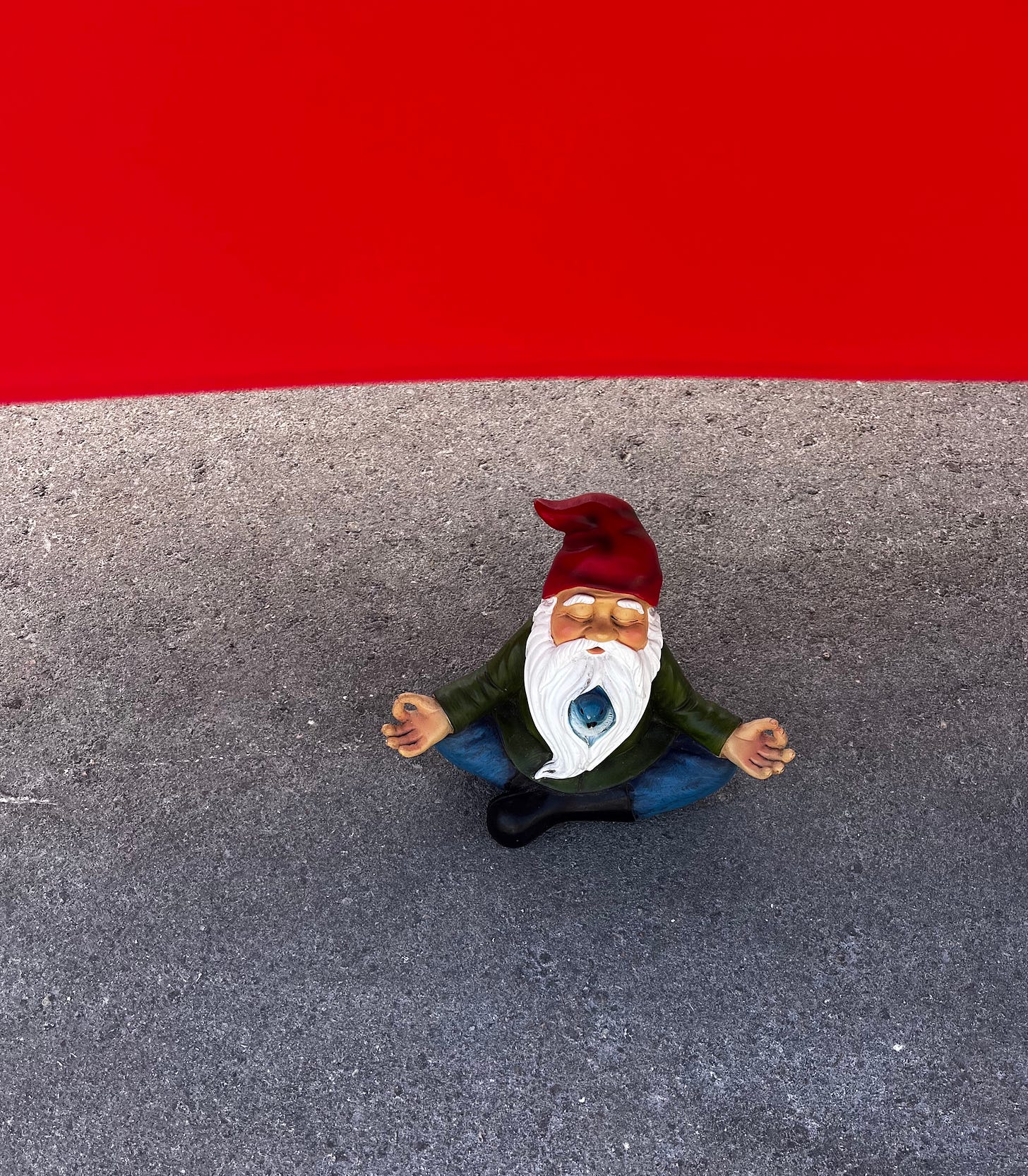
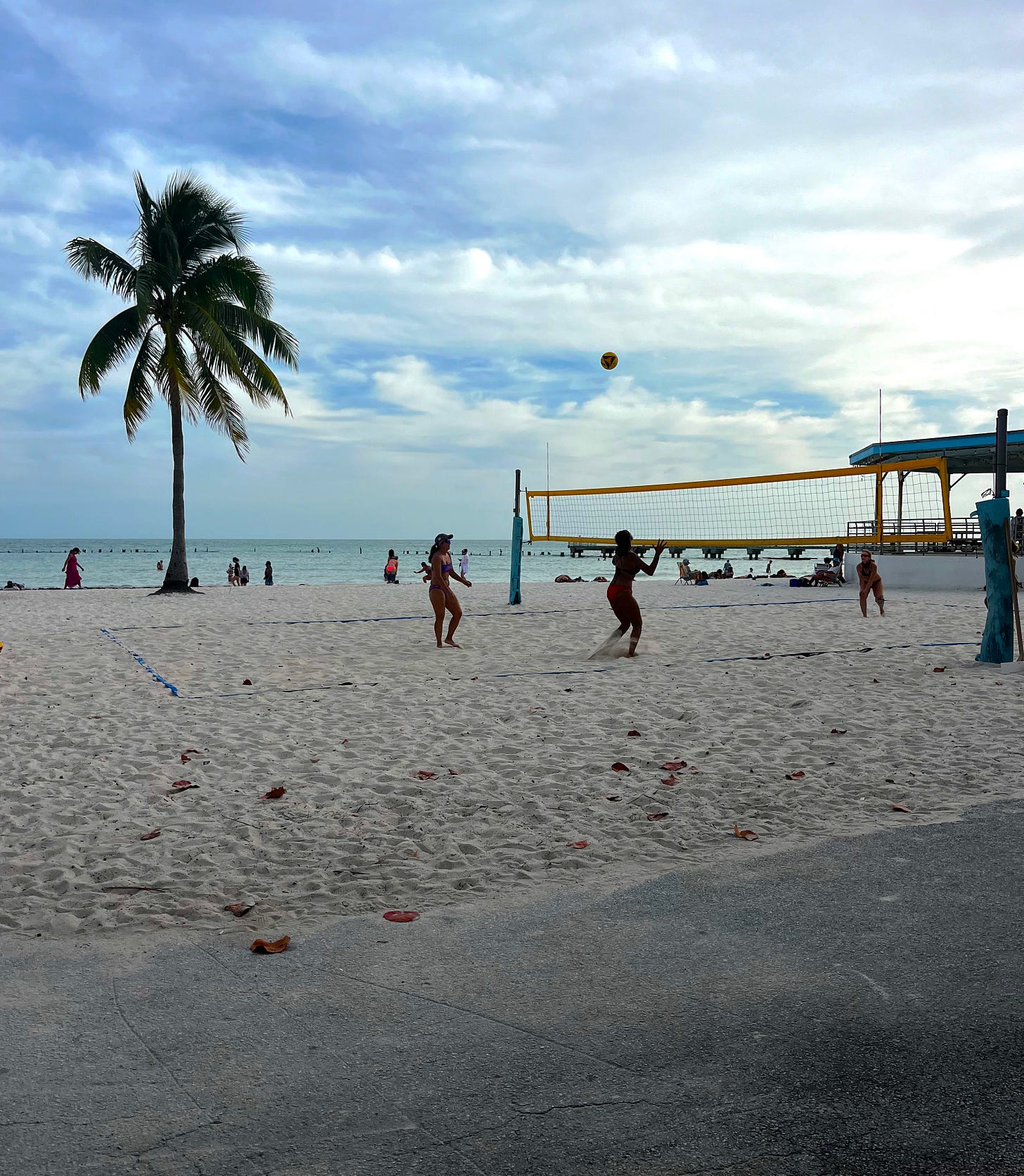
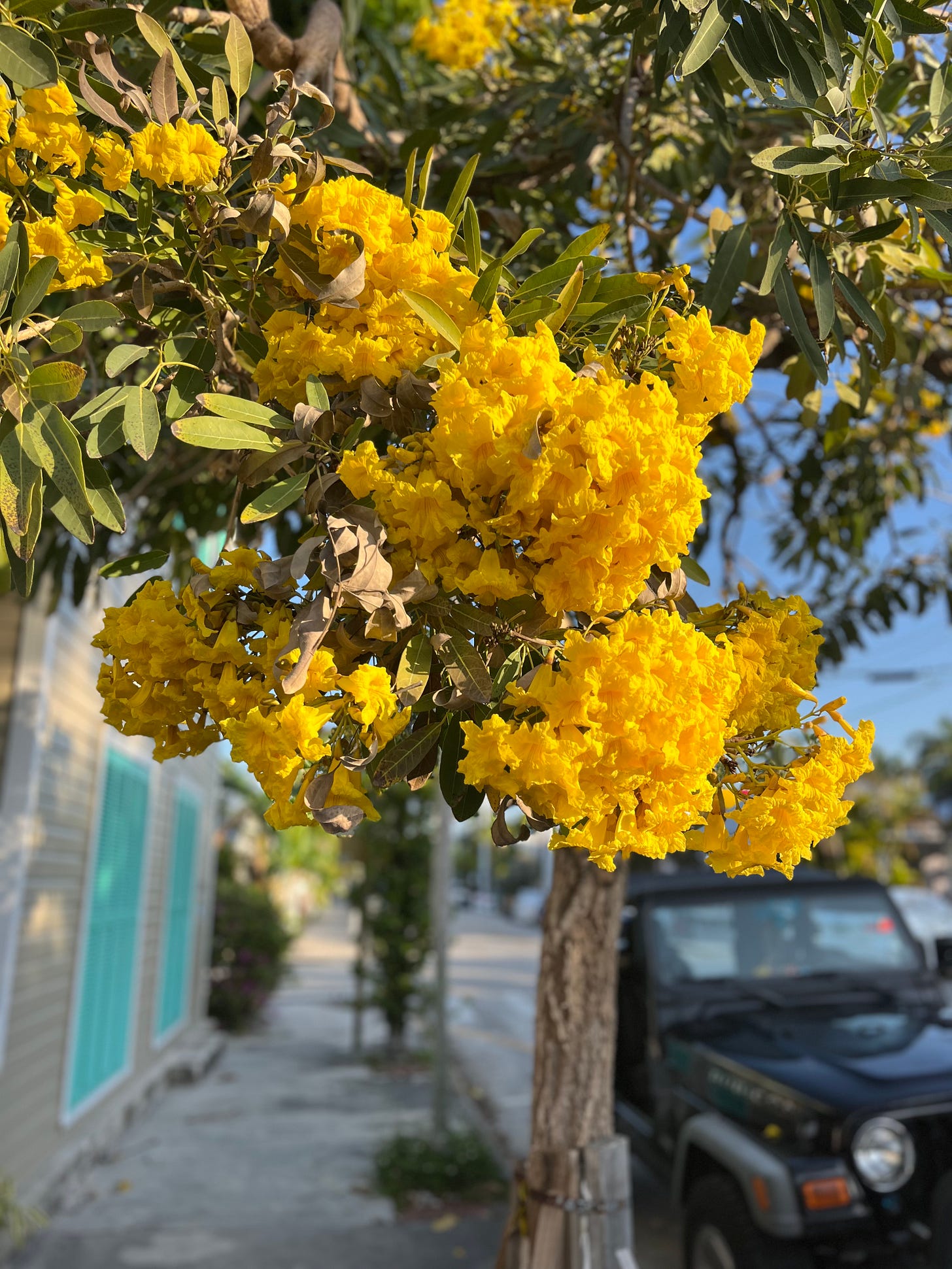
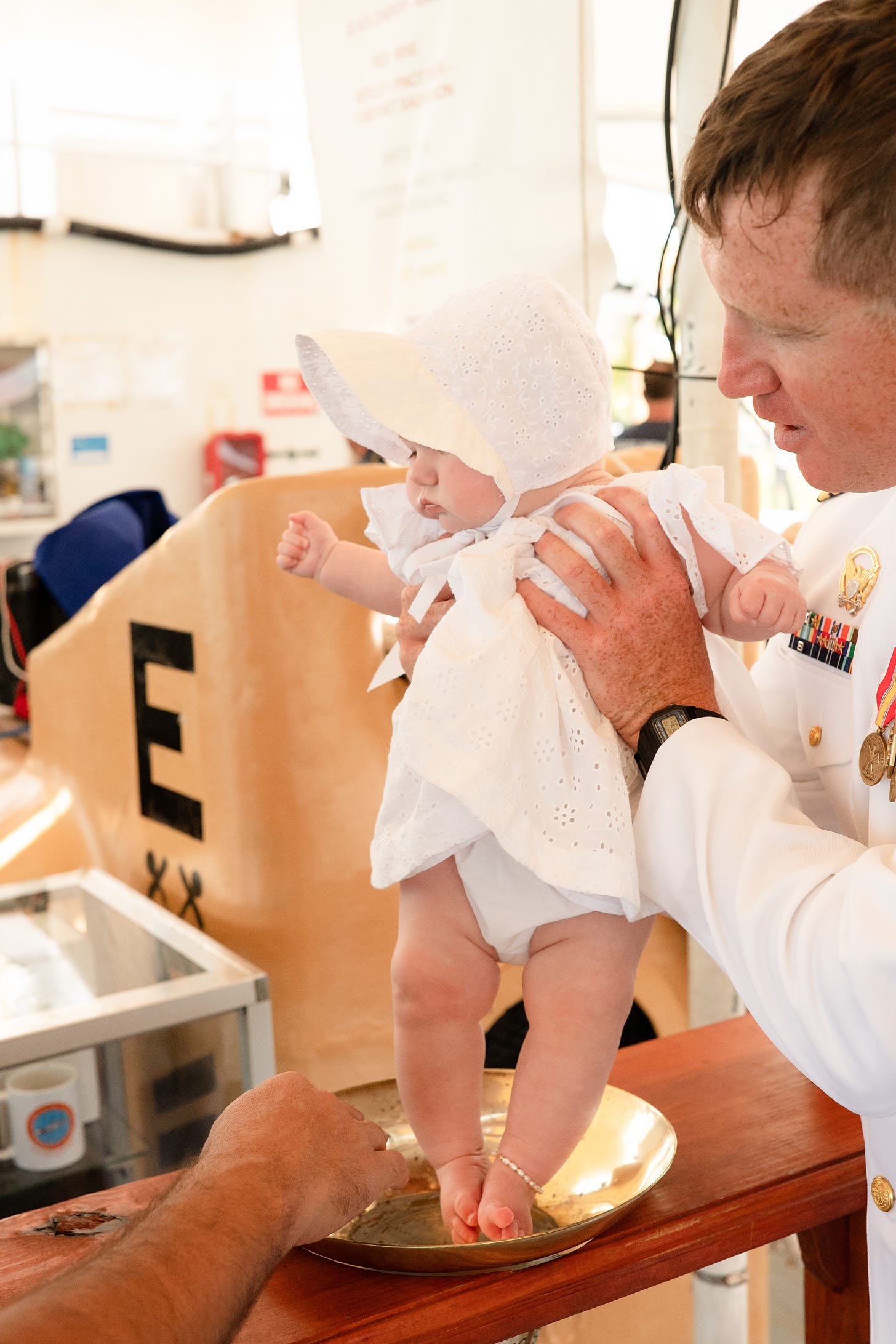

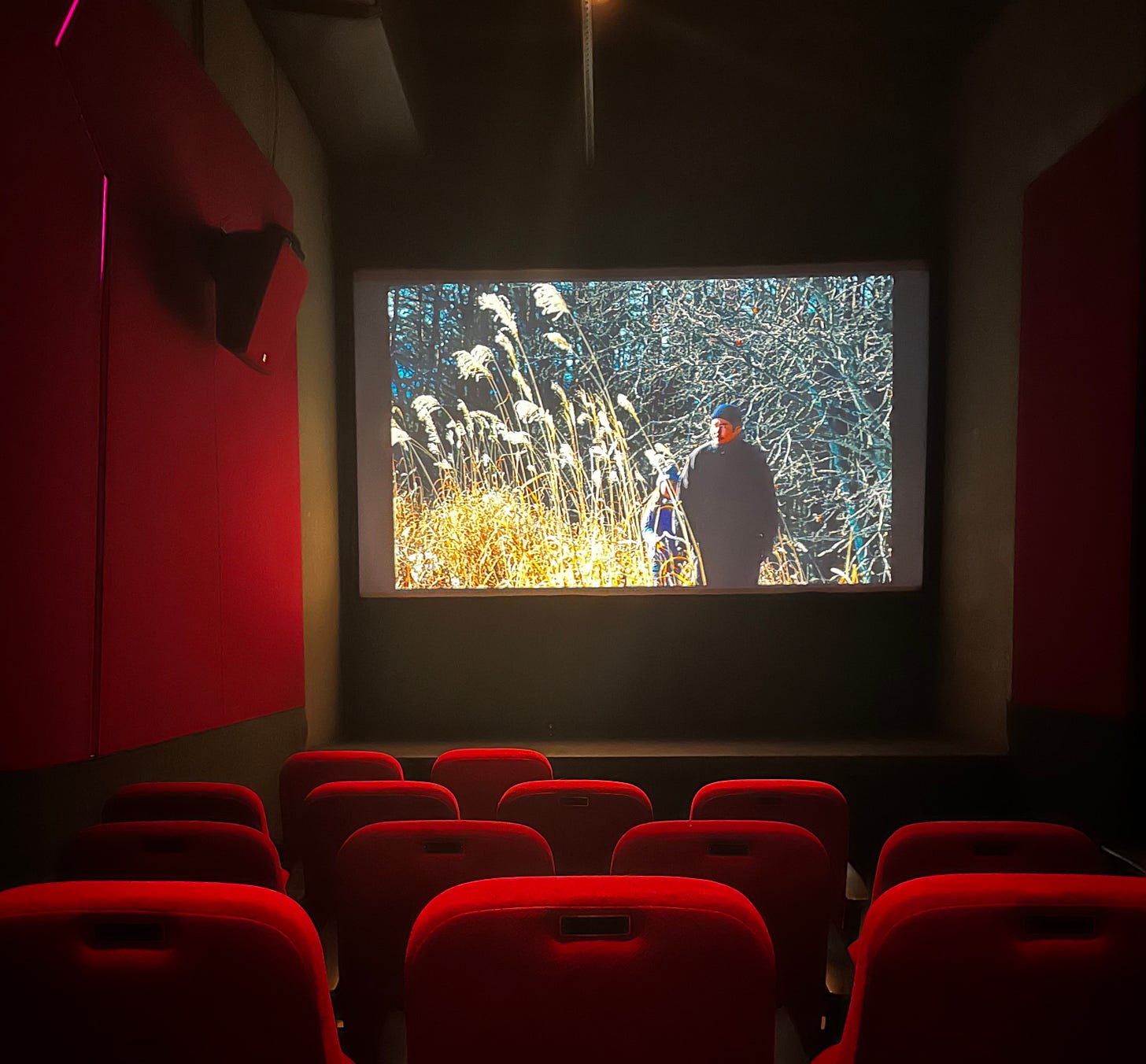

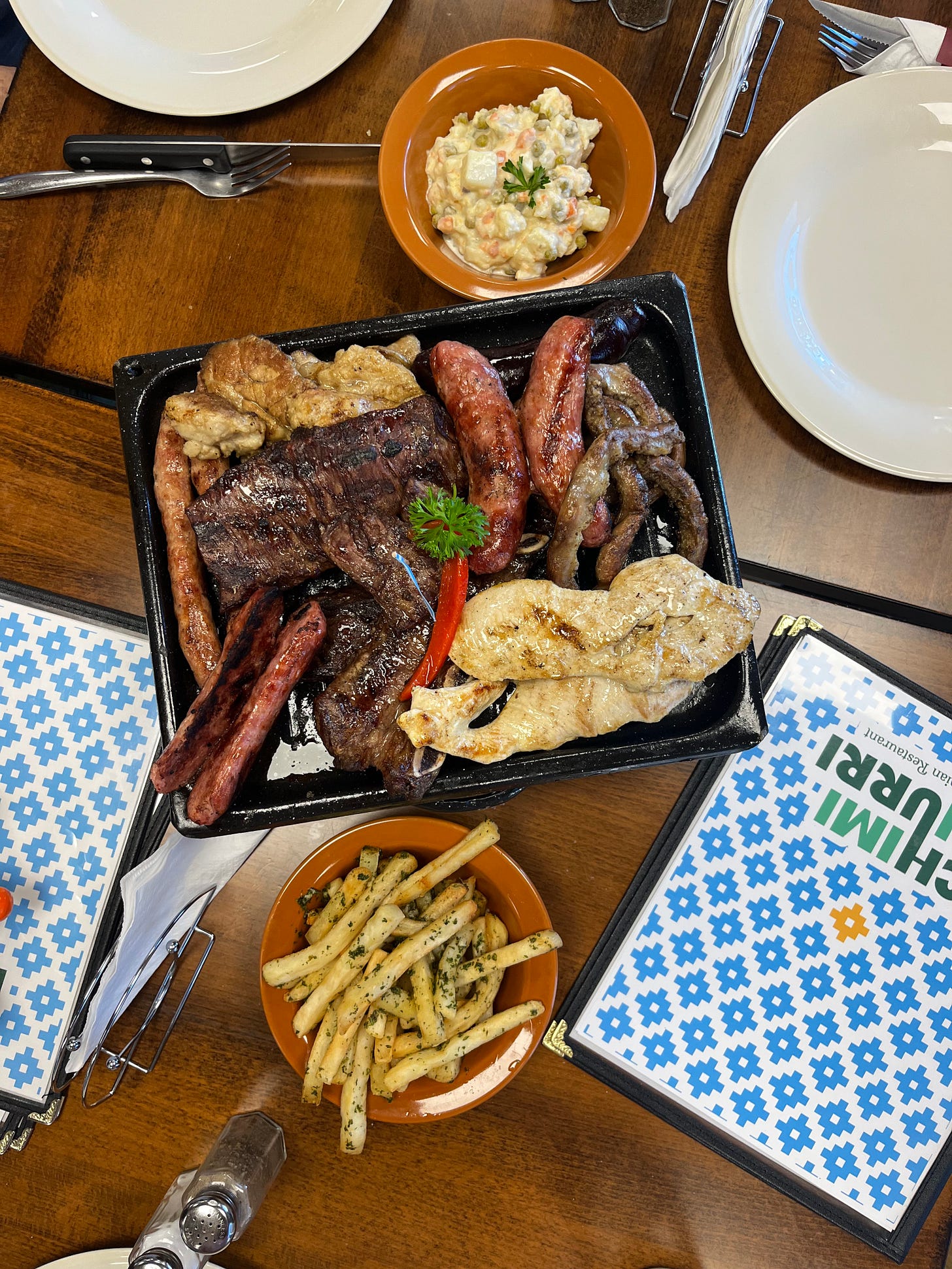
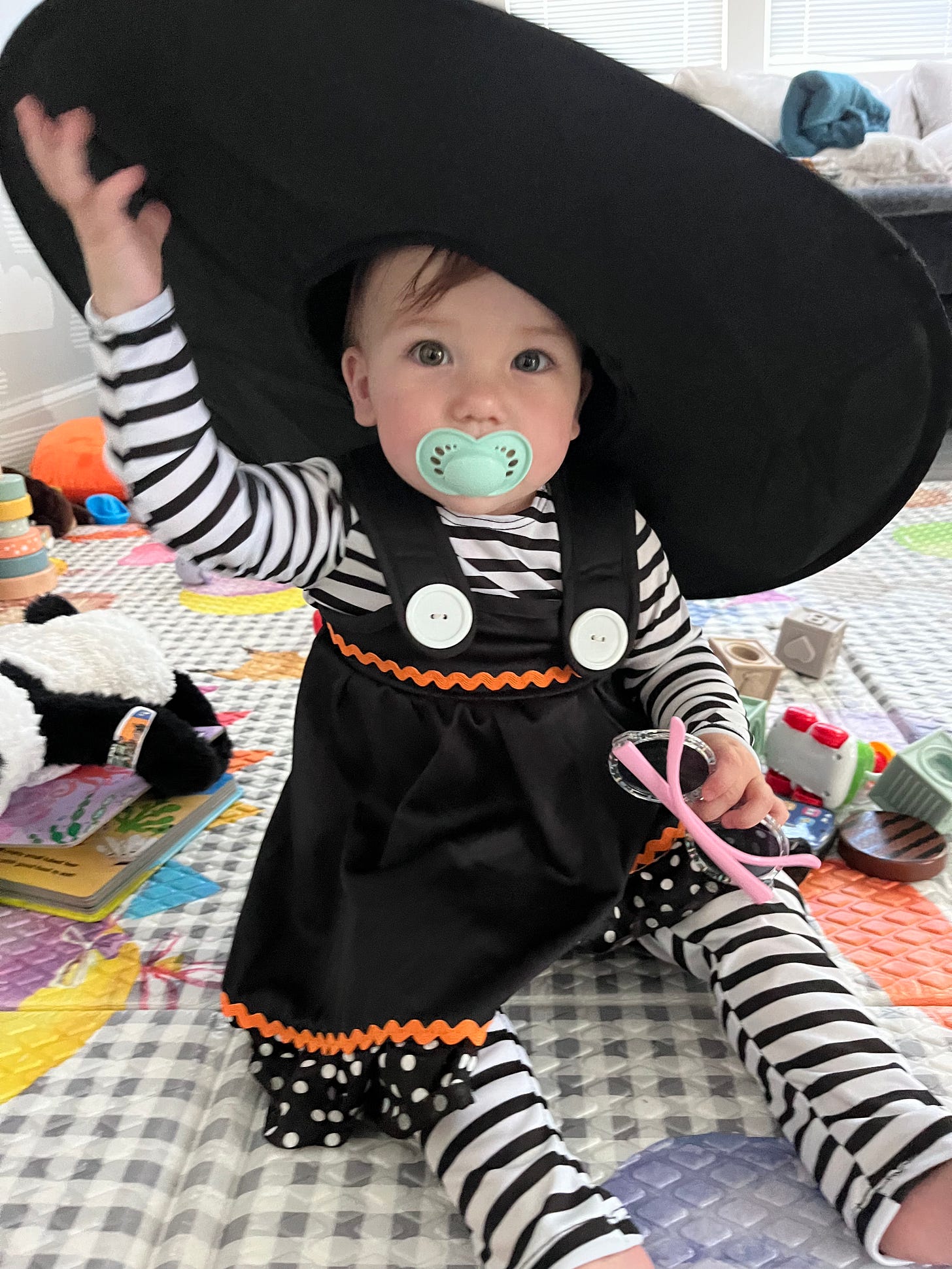
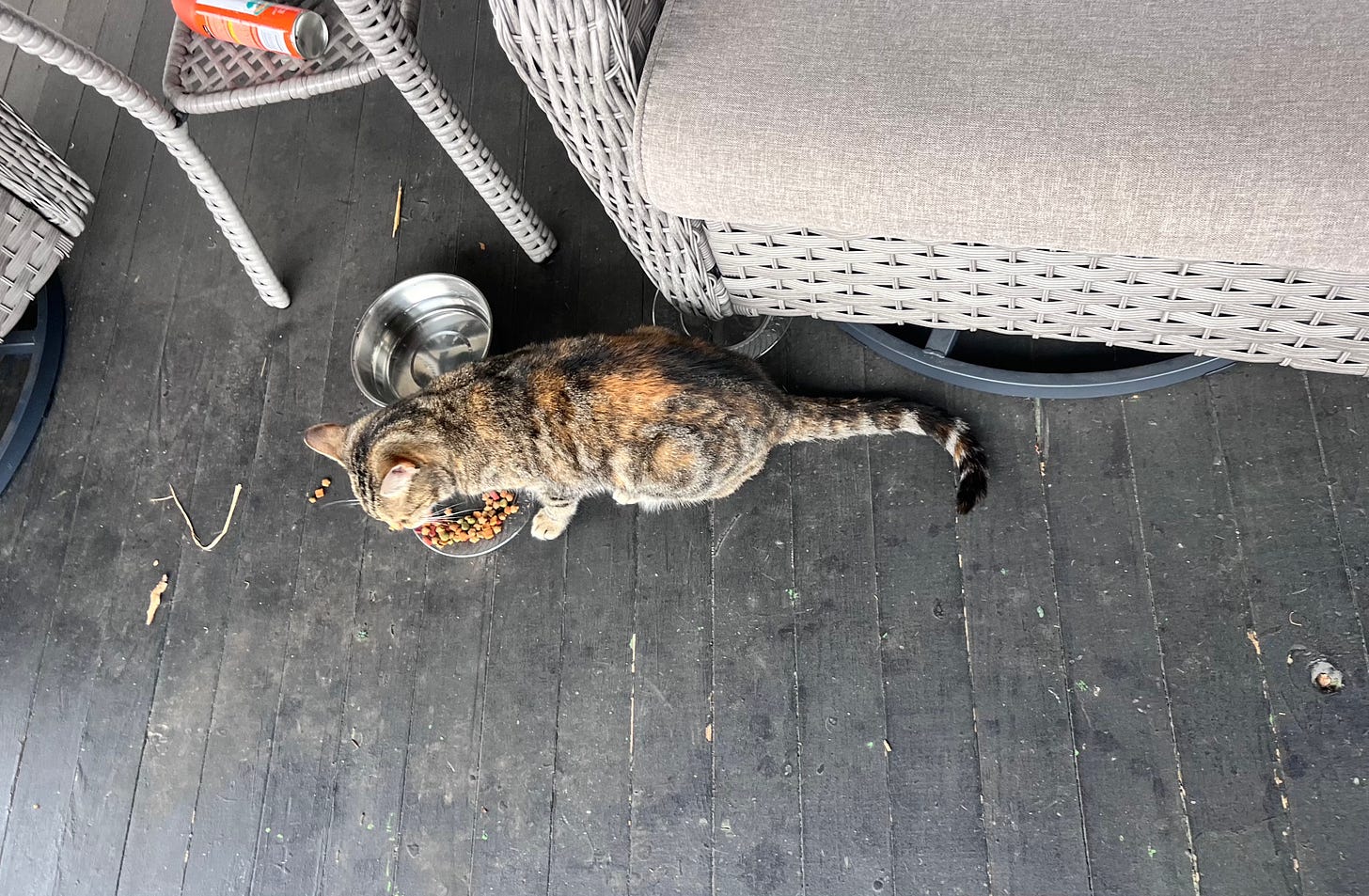

“a friend posted a quote about how in this world of attention scarcity, the greatest act of citizenship is learning is to withdraw your attention, refocus your efforts on the battle or battles you can fight. For me, this singular message seems to extend from the political to the personal.” 👏👏👏
That sucks about the Lamictal! I also unfortunately notice some cognitive side effects with it too, but nothing significant enough to stop. My word recall is definitely worse on it…which isn’t great for a poet, haha. But oh well. I’m learning to navigate around it.
I also gave up The Artist’s Way midway through. For the same reasons. And because I’m the least consistent person on the planet. 😖
Happy New Year! Thanks for sharing your writing and your life! ✨💖✨